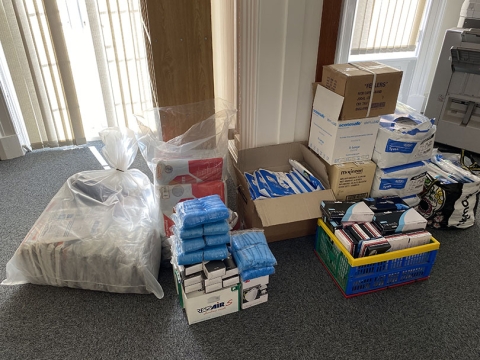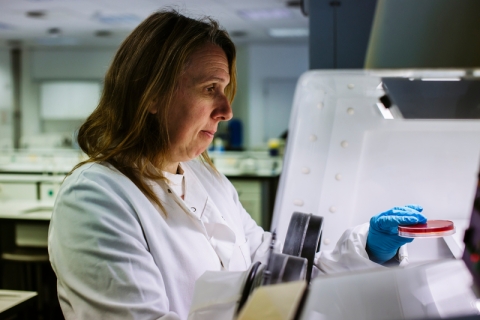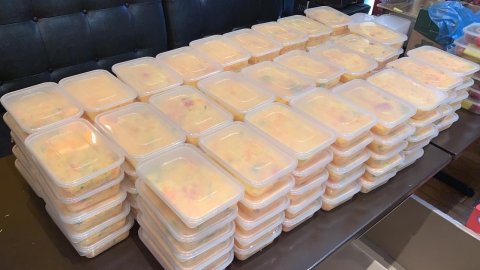Our staff and students are helping the local community to stay safe and well
2 April 2020
3 min read
As we all face the unprecedented consequences of Coronavirus, staff and students at the University of Portsmouth have been helping those effected by the pandemic in our community.
From protecting health professionals to supporting those in isolation, here are some of the ways that we are helping the local community to stay safe and well.
Making face shields to protect health professionals
A team from the Faculty of Creative and Cultural Industries and Faculty of Technology are collaborating to make face shields to protect healthcare professionals on the front line of the fight against the coronavirus pandemic.
Over 2,000 shields have been supplied to Queen Alexandra Hospital in Portsmouth and other NHS Trusts to allow their front line staff, from anaesthetists to nurses, to work safely. A further 1,500 face shields have been made for Hampshire Fire and Rescue Service and Hampshire Constabulary. The team has sufficient plastic to produce another 9,000 to 10,000 shields.
The face shields prevent a user touching their face and provide a barrier if a patient was to sneeze or cough. The shields are safe, easy to use and fit on top of the approved personal protective equipment (PPE) that healthcare workers are using – providing an additional layer of protection between staff and patients.
In comparison to standard face shield designs, which take one-to-two hours to produce using standard 3D printing technology, the new laser cut design cuts the time it takes to produce a mask to less than 30 seconds. This could allow the team to make around 3,000 masks in a day.
Donating critical personal protective equipment
To address the critical need to provide personal protective equipment (PPE) to healthcare professionals and key workers as they work on the frontlines of the coronavirus pandemic, a number of departments across the University are donating vital supplies.
The University’s Institute of Criminal Justice Studies have donated their forensic teaching supplies to the NHS. Through an assessment of their stock, a number of items were donated including paper and fabric face masks, gloves, hair nets, shoe covers and full-body protective suits.
The Schools of Biological Sciences and Pharmacy and Biomedical Sciences have made a donation to Portsmouth City Council of nitrile gloves, face shields and safety eye wear.
The Centre for Enzyme Innovation and School of Biological Sciences have loaned equipment to Queen Alexandra Hospital to support a team investigating the genetic sequencing of Covid-19. A number of our staff will also be working on this research in collaboration with colleagues at the hospital.

Forensic teaching supplies donated by ICJS.
Microbiologist helping in the national effort against coronavirus
Dr Sarah Fouch, Senior Lecturer in Microbiology, is helping with the fight against coronavirus by working weekends at her local hospital.
The microbiologist is testing COVID-19 samples in the microbiology laboratory at Basingstoke Hospital, helping to get essential diagnostic information to doctors and medical staff.
Sarah has maintained her Biomedical Scientists HCPC registration. This means she was able to step right in when asked to join the testing team at the lab when the number of tests required started to grow a few weeks ago.

Dr Sarah Fouch
Providing expertise to reassure the public
Dr Joy Watts, a reader in Environmental Microbiology and Associate Head (Research) in the School of Biological Sciences, took part in a Q&A for The News, to answer reader’s questions about the science behind COVID-19 and its spread.
Helping children through isolation and lockdown
The coronavirus pandemic is a worrying and frightening situation for many people around the world and in particular children, who may not understand why they are not in school and can’t see their friends and family.
Dr Emma Maynard, a senior lecturer in Education, wrote for The Conversation about how we can help children during this time of change and uncertainty.
Feeding the community
Portsmouth Business School student Jigar Patel is helping to make essential food parcels for NHS staff around London.
Working as part of his brother’s charity foundation, Jigar is making and packing the parcels at his brother’s restaurant, Desi Dhaba. They started off making 50 meals a day, but the demand for the parcels has been so great, they have had to employ a team of around 20 volunteers and, with further support from local Indian community trusts, they now make between 1500 to 2000 parcels every day.
Jigar said: “Our vision is to help doctors, nurses and other health and care staff who are vital to the community. We are also serving vulnerable people who need the food in this crucial time, like those who are homeless and older people in care homes.”

Food parcels for NHS staff in London.
